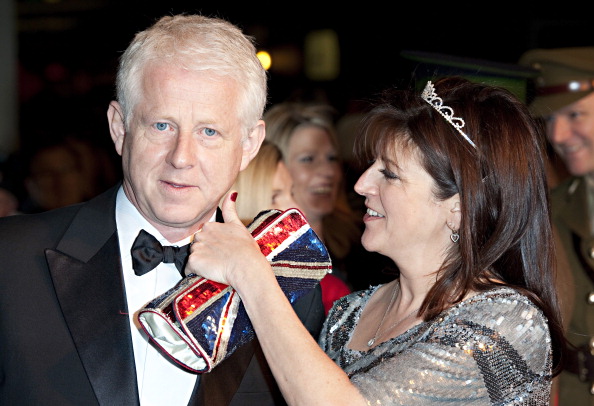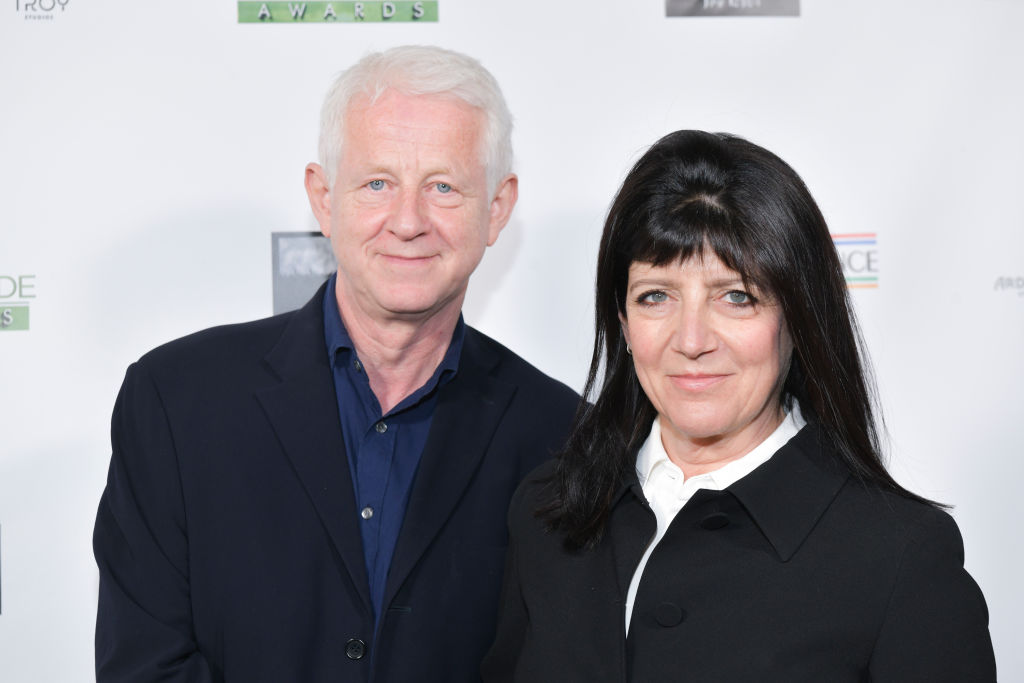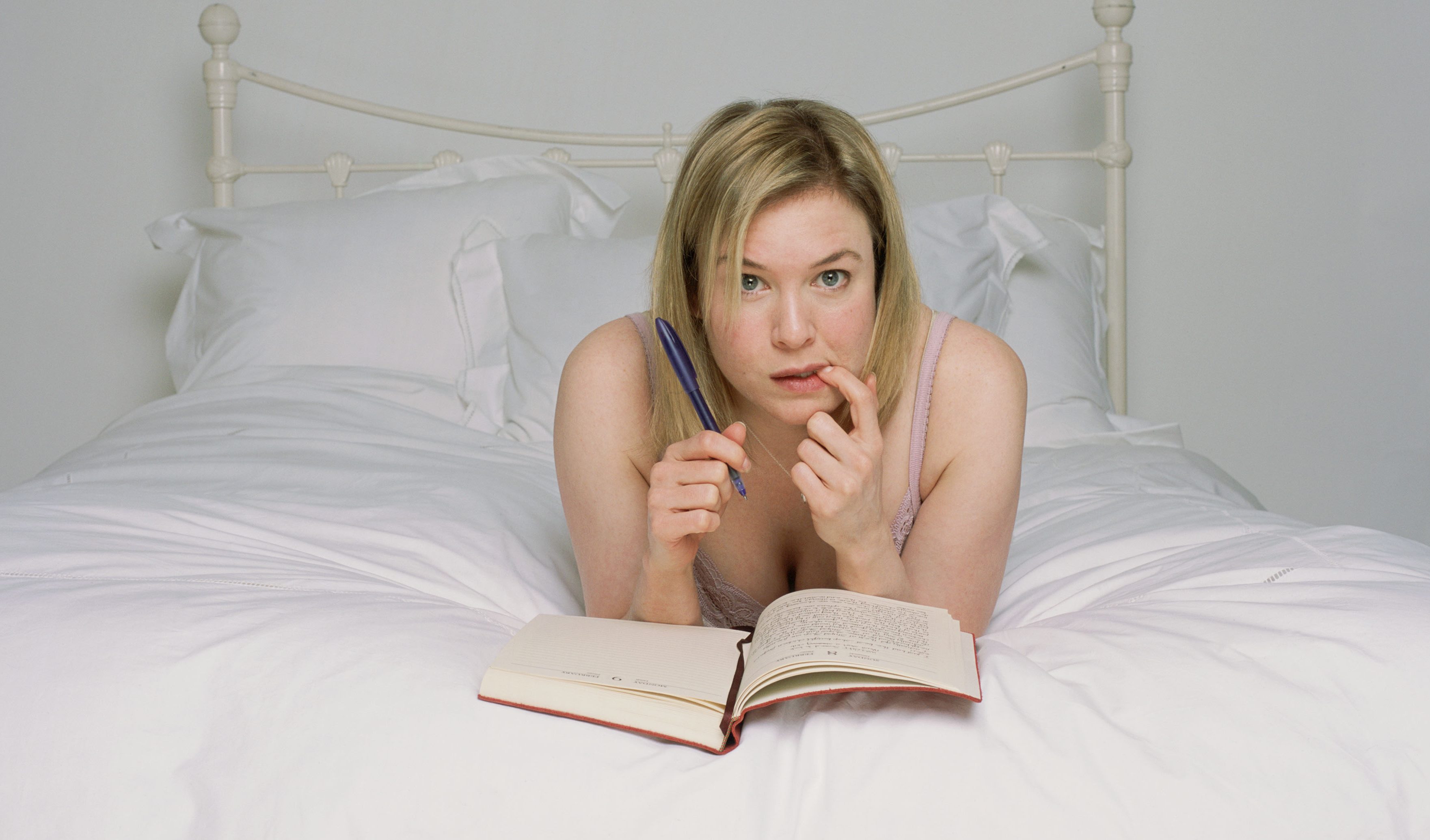
Richard Curtis has reportedly married his partner Emma Freud after spending 33 years with the broadcaster. In celebration, here’s a look back at his most romantic film moments.
The 66-year-old Love Actually and Notting Hill maker’s ‘secret wedding’ was only revealed as Emma, 61, let the news slip at the Cheltenham Literature Festival in Gloucestershire on Saturday.
Richard was also pictured at the event with a gold ring on his wedding finger, with which he was said to have fiddled with throughout, according to guests.
One onlooker told : ‘Emma confessed she had finally got hitched while interviewing Richard E Grant. She said they’d been married for four weeks.’
She apparently then put her finger to her lips and made a ‘funny noise which made everyone laugh’ after mentioning she and Richard were married.
The pair have been together for 33 years, and Emma previously proposed twice unsuccessfully. He refused the first time around and .

Richard, who is also the brains behind noughties classic Bridget Jones, also revealed at the festival he would never include ‘fat’ jokes in his films again and regretted they were not more diverse.
During an interview with his daughter, he said: ‘I wish I’d been ahead of the curve. I think because I came from a very un-diverse school and bunch of university friends, I think that I hung on to the feeling that I wouldn’t know how to write those parts.
‘I think I was just stupid and wrong about that.’
But as Richard gets his romcom moment, here’s a look back at the most romantic moments of his best films.
Beware of spoilers ahead.
Four Weddings and a Funeral (1994)
. Filled with innuendo-heavy wedding services, Hugh Grant at his most charming and disastrous with his hair its most floppy, and even with some seriously heavy, tear-jerking moments – you can’t beat it.
The most moving clip of all comes when Matthew (John Hannah) delivers a heartbreaking speech at the funeral of his secret lover Gareth (Simon Callow) after the character dies of a heart attack.
Reciting W H Auden’s poem Stop The Clocks at the funeral, he reads: ‘Stop all the clocks, cut off the telephone, Prevent the dog from barking with a juicy bone, Silence the pianos and with muffled drum Bring out the coffin, let the mourners come.’
The poem continues, and ends with: ‘The stars are not wanted now: put out every one; Pack up the moon and dismantle the sun; Pour away the ocean and sweep up the wood; For nothing now can ever come to any good.’
On a jollier note, the main love story in the film sees Charles (Hugh Grant) muddle his words in an effort to express his feelings to love-of-his-life American Carrie, who he met at a wedding.
After going wedding dress shopping with her – awkward – he runs after her and mutters something that’s so unromantic, it’s actually very romantic. Classic Curtis writing, there.
‘I just wondered whether, I mean obviously not because I’m just some git who has slept with nine people – I really feel – in short, to recap in a slightly clearer version, in the words of David Cassidy, while he was still with The Partridge Family, I think I love you.’
Love Actually (2003)
There are so many romantic moments in everyone’s favourite romantic , it can be hard to pick one.
Butas peak Curtis-romance comes when Colin Firth’s character, Jamie, travels to Portugal to propose to Aurelia. The pair met when she cleaned his French house where he happened to be staying after his fiancé cheated on him with his brother. Ouch.
Having not been able to communicate much with one another save the odd coy smile and over-the-top gesture – as Jamie didn’t speak Portugese, and Aurelia didn’t speak English – the pair parted ways. Seemingly forever.
But then Jamie returns to Portugal armed with having learnt his love’s language. With Aurelia’s excitable family and whole village in tow, Jamie turns up to the restaurant Aurelia works in.
‘Beautiful Aurelia, I’ve come here with a view to asking you, to marriage me,’ he says, in broken Portugese, adding to the comedy value of the scene.
‘I know I seems an insane person because I hardly knows you, but sometimes things are so transparency, they don’t need evidential proof. And I will inhabit here, or you can inhabit with me in England,’ he continues.
‘Definitely go for England, girl. You’ll meet Prince William then you can marry him instead,’ chimes in Aurelia’s sister.
‘Of course I don’t expecting you to be as foolish as me, and of course I prediction you say no, but it’s Christmas and I just wanted to… check,’ Jamie finishes.
After a pause, Aurelia – who has also romantically learnt English, clearly equally dedicated to Jamie – responds: ‘Thank you, that will be nice. Yes, is being my answer.’
Stop!
Bridget Jone’s Diary (2001)
. This is a film series that has given us some of our best 2000s cultural references, and although her obsession with weight and infatuation with men seems out of touch with 2023 goggles on, the films created some admittedly cracking scenes.
The most romantic has to be in the first film, Bridget Jone’s Diary, where Bridget attends a couple-heavy dinner party and Mark Darcy – who she met on New Year’s Day at her mother’s turkey curry buffet – miraculously appears at too.
That would have been fine, if she hadn’t overheard him saying to his mother on that fateful New Year’s Day that he doesn’t need to be set up with a ‘verbally incontinent spinster who smokes like a chimney, drinks like a fish, and dresses like her mother.’ Rude.
But when they came face to face again, it appears Mark – who Bridget had written off as a snob – really did like her after all, very much actually, just the way she is.

A fed up Bridget is putting her coat on to leave the dreaded dinner party from hell, when Mark appears.
After he compliments Bridget’s Lewisham fire report, in which her almost-bare bottom was exposed on national TV, the titular character blasts Mark.
‘You seem to go out of your way to make me feel like a complete idiot every time I see you, and you really needn’t bother,’ she said. ‘I already feel like an idiot most of the time anyway. With, or without, a fireman’s pole.’
But Mark wanted to make amends. ‘Look, um, I’m sorry if I’ve been – I don’t think you’re an idiot at all,’ he said.
‘There are elements of the ridiculous about you,’ he went on, being brutally honest.
‘Your mother is pretty interesting. And you rally are an appallingly bad public speaker. You tend to let whatever’s in your head come out of your mouth without much consideration of the consequences.
‘I realise that when I met you at the turkey curry buffet that I was unforgivably rude – and wearing a reindeer jumper that my mother had given me the day before – but the thing is, what I’m trying to say, very inarticulately is that, in fact, perhaps, despite appearances, I like you. Very much.’
Bridget scoffs at this, listing off her flaws: ‘Apart from the smoking, and the drinking and the vulgar mother, and the verbal diarrhoea…’
‘No, I like you very much. Just as you are,’ he responded, simply. And bam, Bridget was in love. (And so were we all.)
Notting Hill (1999)
One of the most iconic London film scenes of all times happens in a little Notting Hill book shop between Julia Roberts and Hugh Grant (shock) in the film names after the London borough.
After asking humble bookshop owner William (Hugh) out, famous movie star Anna (Julia) leaves disappointed – but not before making one of our favourite ever romantic speeches.
Explaining why he can’t pursue his relationship with Anna, William says: ‘The thing is, with you I am in real danger. It seems like a perfect situation. Apart from that foul temper of yours. But my relatively inexperienced heart would I fear not recover if I was once again cast aside as I would absolutely expect to be.
‘There are just too many pictures of you. Too many films. You know, you’d go, and I’d be. Well, b**gered, basically.
He continues: ‘I live in Notting Hill, you live in Beverly Hills. Everyone knows who you are. My mother has trouble remembering my name.’
But then Julia comes out with this historic mic drop: ‘The fame thing isn’t really real, you know? And don’t forget, I’m also just a girl standing in front of a boy, asking him to love her.’
Hearts melted all over the place. Thankfully, it all ended in happiness.
About Time (2013)
In , About Time, sees a time travelling Englishman called Tim (Domhnall Gleeson) get swept off his feet by a woman called Mary, played by Rachel McAdams.
They meet in an eat-in-the-dark restaurant in London, and the moment Mary steps outside to greet the romantic lawyer is a pretty cute one.
After looking visibly chocked by her appearance as she almost trips over on exiting the restaurant, Tim asks: ‘Would it be very wrong if I asked you for your number? Just incase I ever had to call you about…
‘Stuff, okay,’ she responds, seemingly with a similar gentle temperament.
‘It’s Mary,’ she adds, before he declares: ‘I thought this phone was old and s**t, but suddenly it’s my most valuable possession.’
The world of Bumble, Hinge, and Tinder – are you taking note?




















